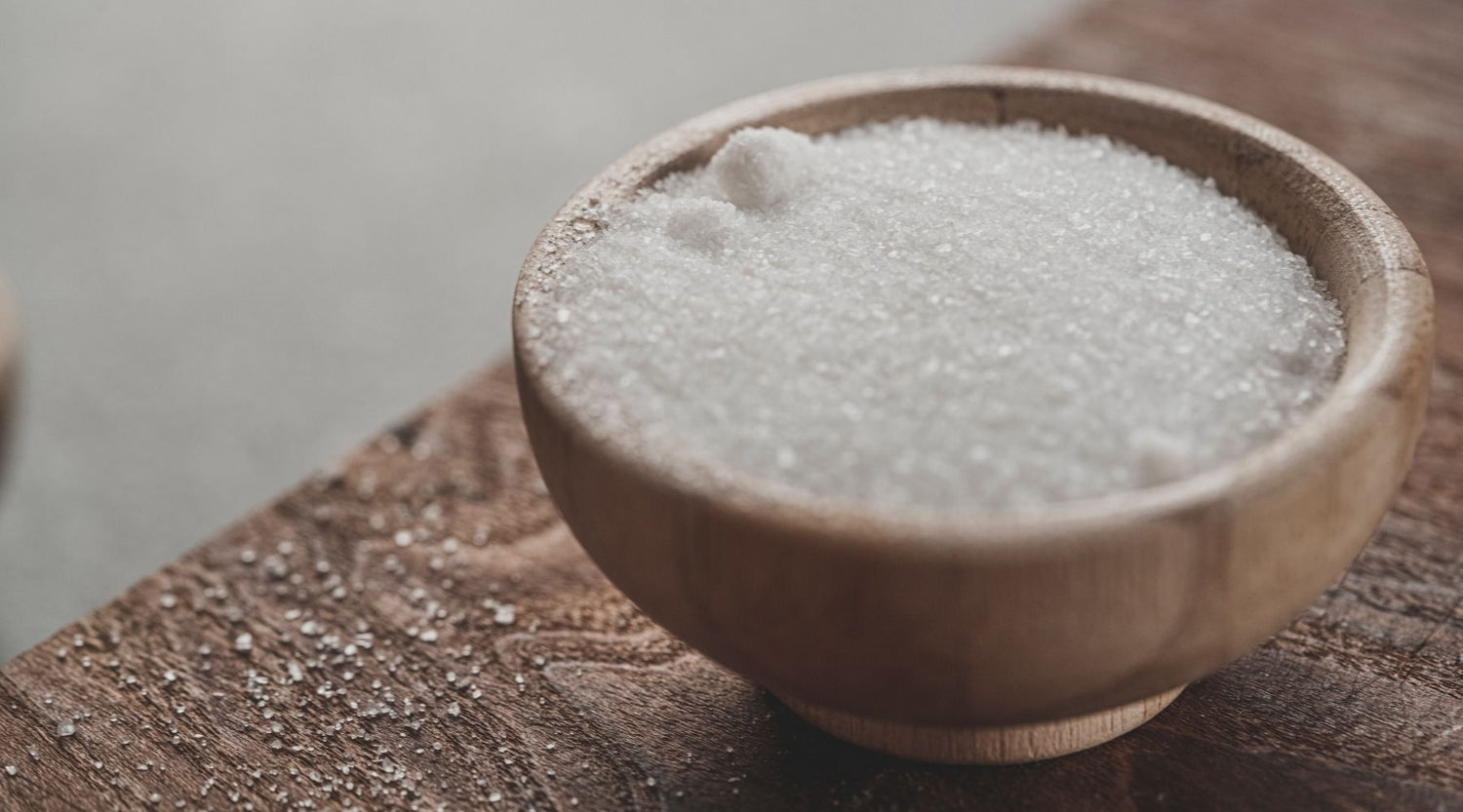Ever since we made our Cool Beans, the topic of sugar has been omnipresent. In this context, we asked ourselves: What differences are there between the different types of sugar? Is cane sugar healthy – or healthier than other varieties? And how does it change chemically during the manufacturing process? What sugar alternatives are there and are they healthy? If you ask yourself similar questions, we want to make it easier for you to find answers and share our results with you here.
What exactly is sugar?
Not all sugar is the same. Or rather: There is not just one sugar. That's why the answer to the question “What actually is sugar” isn't that easy. In addition to the well-known fruit sugar (fructose), there is also milk sugar (lactose), dextrose (glucose) and granulated sugar (or colloquially: table sugar, i.e. sucrose). While the types of sugar are similar in their basic components - they all contain hydrogen, carbon and oxygen - they differ primarily in their molecular structure.
🍫 Are you interested in even more knowledge about chocolate? Then subscribe to our Chocletter and take your chocolate knowledge to a new level! 👉 Register here now 👈
What is the difference between (crystal) sugar and cane sugar?
Many people consider cane sugar to be healthy or a healthy alternative to normal table sugar. From a purely chemical point of view, there is no difference between cane sugar and granulated sugar. They contain the same amount of calories and nutrients. But while a large part of the world's sugar consists of sugar cane - i.e. cane sugar, the granulated or table sugar consists of domestic sugar beets.
By the way, if you feel the same way: cane sugar is not to be confused with raw cane sugar - the latter is called “raw” because it is unrefined. This means nothing more than that it has been less purified than white table sugar. This is why it is considered more environmentally friendly because it has been processed less. From an environmental perspective, the best option is whole cane sugar. This consists of filtered, boiled sugar cane syrup and is the least processed form of cane sugar.
The question is certainly still exciting for many: Can you replace granulated sugar with cane sugar? The answer to that is yes, and quite unproblematically in a ratio of 1:1. If you use cane sugar instead of granulated sugar when baking, it is important to note that the dough should then be stirred or kneaded for longer. The crystals of cane sugar are slightly larger and therefore take longer to dissolve in the dough.
Is cane sugar and brown sugar the same?
In short: yes. As mentioned above, the brownish color is due to the manufacturing method. This is primarily because the sugar is less purified or refined. The white “color” actually only appears in the final wash cycles. By the way, brown sugar or cane sugar contains slightly more minerals than regular white table sugar.
Is cane sugar healthy – or at least healthier?
In short: not really. Brown sugar or cane sugar contains slightly more minerals overall - especially potassium - than ordinary white table sugar. However, these amounts are so small that they do not have a significantly different effect on the nutrient supply. The carbohydrate and calorie content of the different types of sugar are also (almost) identical. And (unfortunately) it makes no difference to your dental health whether you consume (raw) cane sugar or table sugar.
How healthy are sugar alternatives?
In addition to granulated sugar, cane sugar, raw cane sugar and whole raw sugar, there are numerous other sweeteners that often have the reputation of being healthy or healthier than normal sugar. Given the multitude of sweeteners, the question is: What is the healthiest sugar substitute? Or rather: Is there even a healthy sugar substitute?
Honey and agave syrup, healthy alternatives to table sugar and cane sugar?
Honey is probably the best-known alternative sweetener that people have used to sweeten foods for thousands of years. In addition to its natural sweetness, honey also contains a number of nutrients such as minerals, enzymes, amino acids and vitamins. That's why many people consider the golden juice to be a healthy alternative to sugar. Unfortunately, we have to dispel this misconception at this point. The nutrient content in honey is so low that you would have to eat enormous amounts to feel a positive effect. However, this would then be more than offset by the associated high sugar content.
Another “healthy” sugar alternative that is particularly popular with vegans is agave syrup. It is true that agave syrup also contains healthy ingredients: minerals, trace elements and secondary plant substances. However, agave syrup has a very high fructose, i.e. fructose, content, which many people cannot tolerate well. And here, too, the same applies to honey: benefiting from the nutrients is not possible at all with a normal dosage. Another negative point for agave syrup is its poor environmental balance. The liquid sweetener has to be transported from far away to Germany and therefore has an enormous Co2 footprint.
Honey, on the other hand, can be bought relatively easily from local beekeepers, at least in Germany. On the one hand, this can support a traditional, dying industry and, on the other hand, the climate can be relieved through regional consumption.
The answer to the classic question: "Which is healthier, honey or agave syrup?" but is rather disappointing. Both sweeteners are not healthy. For some people, agave syrup is a little unhealthier than honey due to its high fructose content.
 Honey or agave syrup? (Photo by Arwin Neil Baichoo on Unsplash )
Honey or agave syrup? (Photo by Arwin Neil Baichoo on Unsplash )
Is maple syrup healthy compared to table and cane sugar?
Then there is maple syrup, the popular sweetener from Canada. Is maple syrup a good, healthy sugar substitute?First things first: Maple syrup is boiled down maple sap that has previously been tapped from maple trees, usually on Canadian or Chinese plantations. The syrup is particularly popular because of its special taste. Because of its high water content, maple syrup also has fewer calories than normal sugar. But at the same time it is also less sweet. But if you want the same sweetness as sugar, you have to use more syrup and the positive effect of the saved calories is lost. Just like agave syrup, maple syrup also has a high fructose content and is therefore not as digestible for some people. Unfortunately, maple syrup is not a healthy alternative either.
The long transport routes of the popular syrup are anything but climate-friendly, whereas sugar and honey are also available regionally produced.
Sugar substitutes and sweeteners: which is better, erythritol, stevia or xylith?
Sugar substitutes and their promises of low calories and no impact on blood sugar sound temptingly good. The most popular sugar substitutes include erythritol, stevia and xylith. But how healthy are they really?Products from this sugar substitute group are low in calories, blood sugar and insulin level friendly and do not cause tooth decay. But: Consuming 20 to 30 g per day can lead to diarrhea and flatulence. For many, significantly smaller amounts are sufficient. Healthy is definitely different.
“Miracle cure” Stevia?
Then there's stevia, which has long been considered the new miracle sweetener. It belongs to the so-called artificial sweeteners. Stevia is 300 times sweeter than table sugar, calorie-free, has little effect on blood sugar levels and does not cause tooth decay. The sweetener is obtained from the tropical plant of the same name, but is definitely not a natural product. This raw material has to go through an intensive chemical process to transform into the popular sweetener.It is difficult to say which of the sugar substitutes listed here is healthier. All three have health benefits, as well as disadvantages and long-term effects that have not yet been sufficiently researched.
Conclusion: Sugar is not really healthy in any form
As you have probably filtered out from the previous paragraphs: neither cane sugar, raw cane sugar, honey nor the other listed sweeteners are really healthy. None of the products deliver on the promise of “healthy” sugar alternatives. The healthiest thing is simply to eat little or no sugar, regardless of its form. In fact, there are even chocolates that are completely sugar-free. You can find some delicious, completely sugar-free chocolates with 100% cocoa content here in our shop .
Even if popular sweeteners such as honey, agave syrup or maple syrup are not necessarily healthier than conventional sugar, they are still delicious! If you would like to try chocolates with alternative sweeteners, our chocolate box with sugar alternatives is definitely the right thing!
To end on a somewhat conciliatory note: Sugar is unhealthy, yes. But as long as you consume it in moderation, for example in the form of fine, sustainable and fairly traded chocolate, your health will certainly not suffer. Chocolate is also known to make you happy and therefore has a positive influence on your mental health. :)
FAQ on sugar and sugar alternatives
Is cane sugar better for diabetes than other sugar?
If you mean whether cane sugar is healthy or healthier than other sugar, we have to disappoint you. On a chemical level, cane sugar causes exactly the same effects in the body and therefore on blood sugar.
Is beet sugar healthy?
Ultimately, beet sugar is just another name for the household sugar produced in Germany. The sugar beet is a plant also native to Germany, from whose juice commercial table sugar is made. And from a scientific perspective, "beet sugar" is no less healthy or healthier than other types of sugar such as cane sugar, which is made from sugar cane.
Does it make sense to use cane sugar instead of sugar?
If you are looking for a healthy alternative to table sugar, it makes no sense to use cane sugar. From a health perspective, the two types of sugar have nothing in common. If you are looking for a sweetening alternative that is more environmentally friendly, you can use whole cane sugar. This is less processed and is significantly better for the environment due to the lower use of chemicals in production.
Is cane sugar good for baking?
Cane sugar can be used in baking just as well as regular sugar. However, if it is a little coarser, you may have to stir it a little longer to get a smooth dough consistency.
Header photo by Faran Raufi on Unsplash



